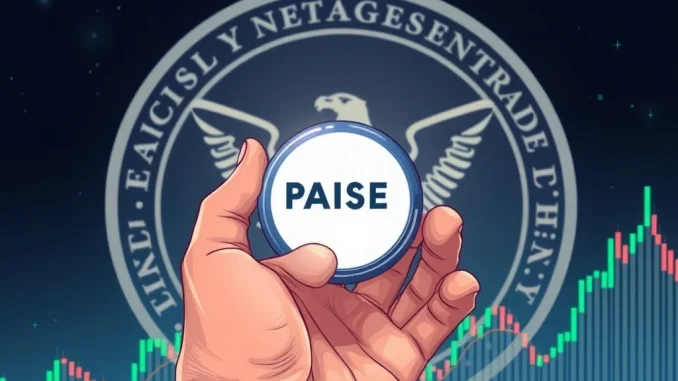
The world of digital asset investment is constantly evolving, and few developments capture attention quite like the journey of Exchange-Traded Funds (ETFs) in the cryptocurrency space. Recently, the U.S. Securities and Exchange Commission (SEC) delivered a significant jolt to the market, announcing the suspension of accelerated approval for Bitwise Asset Management’s proposed conversion of the Bitwise 10 Crypto Index Fund into an ETF. This unexpected reversal has sent ripples across the industry, highlighting the ongoing regulatory scrutiny faced by crypto-related financial products.
What Just Happened with the Bitwise ETF?
On July 22, 2025, the SEC’s Division of Trading and Markets initially granted accelerated approval for the Bitwise ETF conversion. This was a moment of optimism for many, signaling a potential easing of regulatory hurdles for crypto investment vehicles. However, this optimism was short-lived. Just a day later, Assistant Secretary Sherry R. Haywood announced the swift withdrawal of this approval, stating that the matter would be reviewed by the full Commission. The SEC cited Rule 431 as the basis for this pause, a rule that allows the agency to halt decisions pending a comprehensive review, though they declined to provide further specifics.
The Bitwise 10 Crypto Index Fund, which previously traded over-the-counter under the ticker BITW, is designed to track a diverse basket of cryptocurrencies weighted by market capitalization. This includes major players like Bitcoin, Ethereum, XRP, Solana, and Polkadot. Its proposed ETF structure was seen as a crucial step towards making diversified crypto exposure more accessible to mainstream investors.
Why Did the SEC Suspend This Crypto ETF Approval?
The SEC’s abrupt reversal echoes a similar pattern seen with the Grayscale Digital Large Cap Fund, which also experienced an accelerated approval followed by a suspension of its ETF conversion request. Grayscale has even indicated a readiness to pursue legal action to resolve its situation, underscoring the high stakes involved in these regulatory battles.
While the SEC has remained tight-lipped about the specific motivations behind these suspensions, analysts have offered several compelling theories:
- Strategic Approvals for Deeper Scrutiny: Scott Johnson, General Partner at Van Buren Capital, speculated that initial accelerated approvals might be a strategic move. This could allow for deeper scrutiny or intervention by Commissioners known for their skepticism towards crypto, such as Caroline Crenshaw. It’s a way for the agency to gain more time and leverage for a thorough examination.
- Internal Shifts and Delays: Johnson also pointed to potential internal shifts or disagreements within the SEC as a factor contributing to delayed or reversed decisions. Regulatory bodies, like any large organization, can experience evolving perspectives and priorities.
- Towards a Standardized Framework: Bloomberg Intelligence analyst Eric Balchunas suggested that the SEC might be working towards establishing a more standardized framework for crypto ETFs. This could potentially replace the current 19b-4 filing process with a more streamlined review mechanism. Such a move would aim to create clearer guidelines and reduce ad-hoc decision-making, ultimately benefiting the entire digital asset investment landscape.
What Does This Mean for the Future of SEC Crypto ETF Listings?
The recurring pattern of accelerated approvals followed by suspensions underscores the SEC’s consistently cautious approach to regulating digital assets. The agency is walking a tightrope, balancing the drive for financial innovation with its paramount responsibility for investor protection. This careful stance means that while demand for crypto-focused investment vehicles continues to surge, the path to widespread crypto ETF approval remains fraught with uncertainty.
For market participants, the situation leaves them in limbo. The lack of clarity on the SEC’s definitive stance creates a challenging environment for planning and investment strategies. It also highlights the need for greater transparency from the regulatory body regarding its decision-making processes and long-term vision for digital assets.
Navigating the Regulatory Scrutiny: A Path Forward?
The current environment of heightened regulatory scrutiny means that firms seeking to launch crypto ETFs must be prepared for rigorous examination and potential setbacks. This isn’t necessarily a bad thing; it forces issuers to build robust products that meet high standards of investor protection, market manipulation prevention, and custody. While frustrating in the short term, this process could lead to a more mature and stable market in the long run.
The industry awaits more definitive guidance from the SEC. A standardized framework, as hinted by Balchunas, would be a welcome development, providing much-needed clarity and predictability. Until then, each application and each regulatory decision will be closely watched, shaping the trajectory of SEC Crypto ETF listings and the broader acceptance of digital assets in traditional finance.
The suspension of the Bitwise ETF’s accelerated approval is more than just a headline; it’s a stark reminder of the complex and evolving relationship between traditional financial regulation and the burgeoning world of cryptocurrencies. While the immediate future of crypto ETFs remains uncertain, this ongoing dialogue between innovators and regulators is crucial for establishing a robust, secure, and transparent framework for digital asset investment. The market will continue to adapt, innovate, and push for the clarity it needs to truly flourish.
Frequently Asked Questions (FAQs)
Q1: What is Rule 431, and how does it apply to this situation?
A1: Rule 431 of the Securities Act of 1933 allows the SEC to declare a registration statement effective on a date earlier than the standard 20-day period after filing. In this context, it was used for accelerated approval. However, the SEC can also use its authority under this rule to suspend or withdraw such accelerated approvals if it determines that a comprehensive review by the full Commission is warranted, as seen with the Bitwise ETF.
Q2: How does the Bitwise 10 Crypto Index Fund differ from a Bitcoin-only ETF?
A2: A Bitcoin-only ETF would track only the price of Bitcoin. The Bitwise 10 Crypto Index Fund, however, is designed to track a basket of the top 10 cryptocurrencies by market capitalization, including Bitcoin, Ethereum, XRP, Solana, and Polkadot. This offers investors diversified exposure to the broader crypto market rather than just a single asset.
Q3: Why is the SEC so cautious about crypto ETFs?
A3: The SEC’s caution stems from several concerns, including investor protection, market manipulation risks, liquidity issues in underlying crypto markets, and custody challenges for digital assets. They aim to ensure that any approved crypto ETF provides adequate safeguards for investors and operates within a robust regulatory framework comparable to traditional financial products.
Q4: What are the potential implications if Grayscale pursues legal action against the SEC?
A4: If Grayscale pursues legal action, it could set a significant precedent for how crypto ETFs are regulated in the U.S. A successful legal challenge might force the SEC to provide clearer guidelines or expedite the approval process for similar products. Conversely, if Grayscale’s challenge fails, it could solidify the SEC’s current cautious stance, making future crypto ETF approvals even more challenging.
Q5: Will the SEC eventually approve more crypto ETFs?
A5: While the timeline remains uncertain, many analysts believe the SEC will eventually approve more crypto ETFs, particularly as the market matures and regulatory frameworks evolve. The ongoing discussions about a standardized framework suggest a move towards greater clarity, which could pave the way for more approvals in the future, albeit under stringent conditions.



